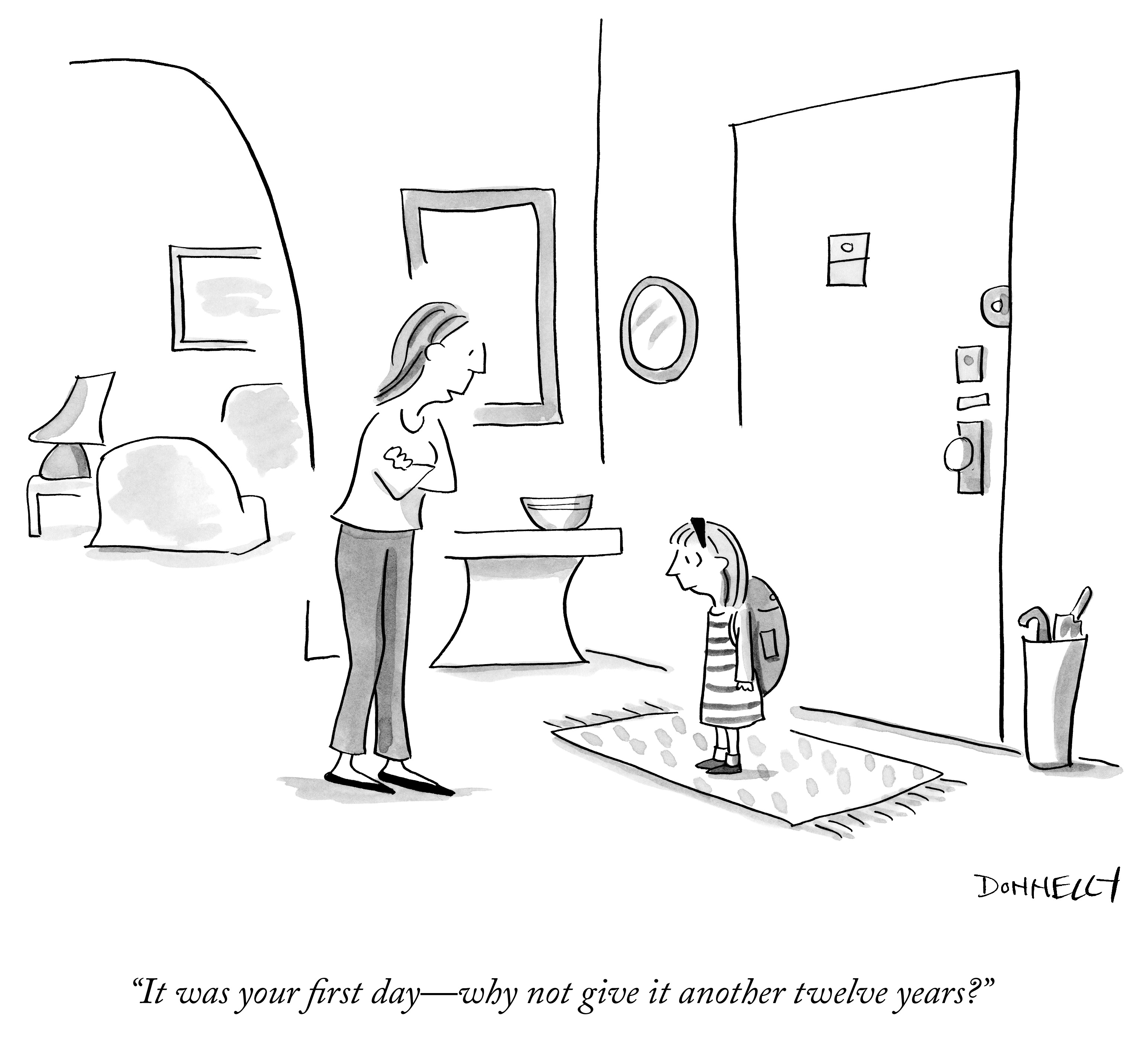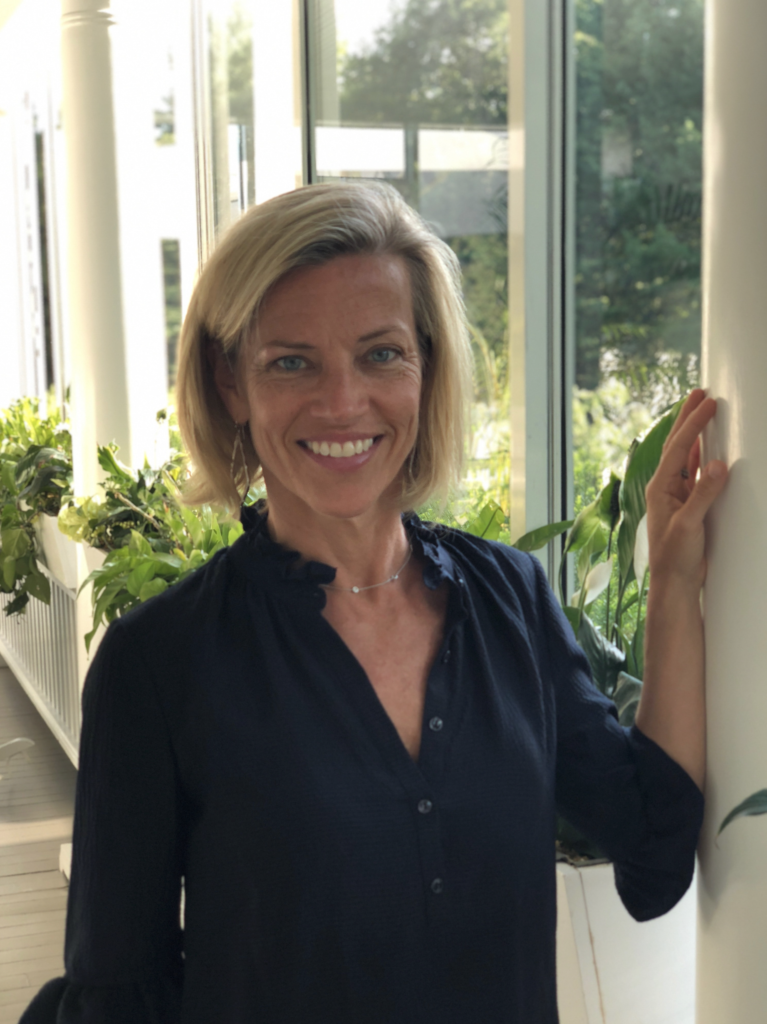I’m thrilled to welcome Cristina Young back to the blog just in time for ‘”back to school”. I always find her commentary (previously here and here) to be useful and on point as I navigate the ever-changing landscape of parenthood. If you are anything like me, you stumble into September feeling unprepared for a faster moving pace and busier children. I have huge intentions of gently asking my kiddos how their day was when I pick them up from school, but most days this past week they’ve hustled into the car and my busy brain is racing along and it’s at least an hour before I remember to say, “Oh wait! Who did you play with? What did you learn? Did you have fun?”. Cristina is spot on with her advice below. I love the idea of giving our kids the confidence to know they are driving their very own bus towards the future, with us, their parents, eagerly waiting in the wings with advice and support when it is needed. The idea of writing a letter to your future self really resonated with me. And for those of us with younger children, it could be just as easy to let your child dictate and you write the letter that they then color in. Setting intentions is a powerful tool. Take a peek below and I am sure you will find a handful of nuggets that help you settle into the new school year with more confidence about how you and your children can make this year one of their best.

*image
Back To School Basics: The Lost Art of Taking Stock
Want to help your kids set goals for the new school year? Teach them to look backwards first.
Fresh starts and new opportunities excite me. The smell of new sneakers, the sight of a clean backpack with the tags still on, pressed khakis with no torn knees yet, blank planners waiting to be organized and color-coded. Optimism is woven into every aspect of the new school year. It’s still palpable for me. Even though I’m 50. How do I contain this giddy feeling so as not to ostracize my teens, ages 16 and 13 ½ , as we look ahead together? I can see them dodging me already as I head into the family room with my clipboards and pens, ready to harness the excitement of the weeks leading up to the first day of school.
Perhaps I can enlist the help of Angela Duckworth. She taught us in her 2016 book Grit: The Power of Passion and Perseverance that the ability to attend to a task and stick to long-term goals is the greatest predictor of success, greater than academic achievement, extracurricular involvement, test scores, and IQ. Gritty students succeed, and failure strengthens grit like no other crucible. So, when our kids fail, perhaps we should get in the habit of asking them to reflect and take stock on what led to the failure and what lessons they learned from their mistakes. This reminds me that I probably need to hit pause and find some time to get quiet and reflect aloud with my kids.
First, I dust off Jessica Lahey’s 2015 book The Gift of Failure: How The Best Parents Learn To Let Go So Their Children Can Succeed, remembering that she suggests: “first, rewards don’t work, because humans perceive them as attempts to control behavior, which undermines intrinsic motivation. Second, human beings are more likely to stick with tasks that arise out of their own free will and personal choice.” Lahey suggests that “if intrinsic motivation happens when kids feel autonomous, competent, and connected to the people and world around them, those three needs must inform our parenting.” As opening day of school creeps towards us, I decide to focus on how to help my kids feel autonomous as they start the new school year.
My son will be starting 8th grade this year. He is a fiercely independent guy who does not enjoy any meddling whatsoever from his parents. My daughter will be a sophomore and is already internally motivated. Always has been. As I approach the task below with both of them, I will gently remind them of what Lahey summarizes so succinctly for us about the capabilities of the adolescent brain: “Adolescents can hold multiple possibilities and ideas in their brain at once and consider how those ideas might play out before launching willy-nilly into a plan,” as they did when they were just elementary school students. So, engaging with them in the art of self-reflection makes sense because we know they are both old enough now to be deliberate in some of their planning. My almost 19 year old is a lost cause. She’s fully cooked and off at college now. Kidding.
Here’s what I came up with….Consider meandering through this list of questions with your adolescent. Keep in mind that you are just suggesting a peak over the shoulder together, but that he is in the driver’s seat on this task. “Locate your mute button” as Lahey advises, and use it wisely. Notice the emphasis here is on learning from past failures and using that wisdom to evolve.
- What went well for you last year in terms of building reliable friendships? What tactics do you think you should repeat this year? (Reliable friends are safe, smart, and supportive friends no matter who’s around).
- What tactics backfired on you, socially? What do you think went wrong and what did you take away from that experience?
- What went well for you last year in terms of study habits and organizational decisions? What habits do you think you should repeat this year?
- Where did you go astray last year in terms of studying, classes, time management? What do you think went wrong and what did you take away from that experience?
- In what areas do you want to improve this year, to beat your record last year, to impress yourself?
- What do you hope a teacher whom you respect might say about you halfway through this year? What will you have to do to earn those words of praise?
- What do you hope a trusted friend might notice about you halfway through this year? What will you have to do to earn those words of admiration ?
- What about a sibling? What do you hope she or he will notice about you as you mature through this next school year? How will he or she know that you’re growing up?
- What areas of conflict do you predict you will have this school year with your parents? Your teachers? Your friends? Your siblings? Other adults in your life? What role can you play in anticipating these conflicts, communicating clearly and promptly about them, and resolving them in a respectful way that still honors who you are trying to become?
- How will you know when you are starting to veer off track this school year? What are the subtle signs or symptoms that will tell you that you’ve lost motivation somewhere? What will be the best way to anchor you and inspire you again?
- Finally, and my kids will roll their eyes at this suggestion, I will ask them to write a letter to their future self. The September 2018 version of them will write to the May 2019 version of them, noting hopes, goals, concerns. Putting pen to paper in this act of self reflection fires up our drive to outdo ourselves, to one-up our younger selves. A healthy internal competition is a great motivator because it’s 100% intrinsic and autonomous.
Remind your kids that the best way to learn is to try, to fail, to suffer and to sit with that discomfort and let it be our teacher—–and then to remedy things, and to try again. Over and over. Failure is our very best teacher. I’m off to number the pages of my Bullet Journal now so I can keep track of my own goals. #nerdygirl #lovegoalsetting #powerinselfreflection

Cristina Young’s Bio:
Cristina Young is a licensed clinical social worker (LCSW) in private practice in Greenwich, CT. Cristina has more than 25 years experience providing professional support to children, adolescents, adults, and families in a variety of settings, including schools, hospitals, and residential treatment centers. She has lived and worked in the Fairfield County area for almost 20 years. Prior to opening her private practice, Cristina worked as a parenting educator, school counselor, admissions officer, and teacher. Cristina received her Master’s in Social Work from the University of Southern California and her bachelor’s and teaching degree from Barnard College, Columbia University. She and her husband have three children, ages 19,16, and 13. In their spare time, Cristina and her husband host “The Neighborhood Project” once a month in their home. This conversation concept, created by The Nantucket Project, intends to bring more people together in regular, open communication with the goal of healing communities. Learn more at https://theneighborhoodproject.com/ . Cristina also volunteers with Building One Community, where she teaches ESL to adults. She is proud to be affiliated with this organization and encourages others to learn more about the work they do and how they can help https://building1community. org/.


Thanks, Lindley and Cristina, this was incredibly helpful!!! truly!! Very wise and I plan to have many new discussions with 12 year old daughter. xoIcy
Love Cristina 😍 She has always given the best staff development programs at FPCGNS!
Cristina is fabulous and leads excellent parenting workshops. She’s a 10!!!